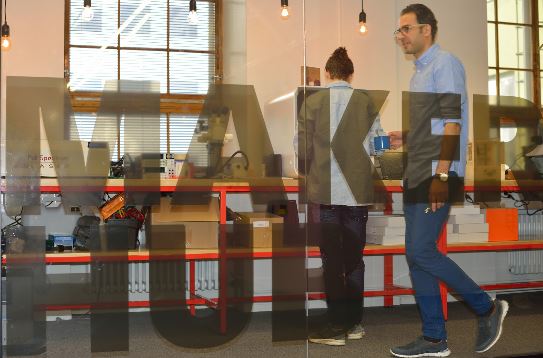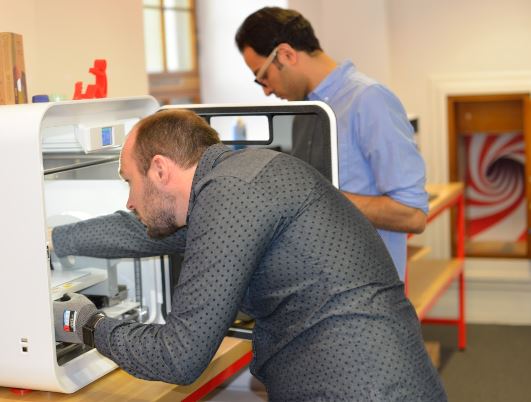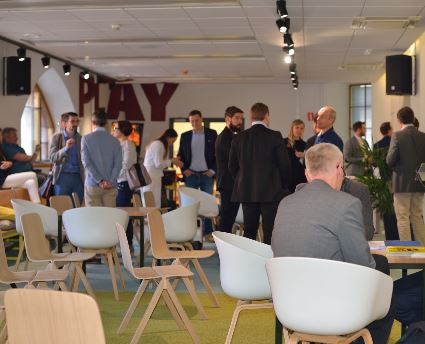Last week a new collaboration space, Flux, opened in downtown Helsinki. Within the beautiful old Korkeavuorenkatu 35 building, a fresh and funky space has emerged. Already it is a hive of activity and the plan is to continue to have an intensive calendar of events in the coming weeks.
Pekka Horo, General Manager, Microsoft Oy welcomed visitors and highlighted the intent of Flux to act as a catalyst hub, to support the local community of small companies and entrepreneurs to grow, nationally and internationally. Certainly Microsoft has that global reach and ability to support.
This is the second community space from Microsoft’s Reactor Project initiative. Following on from the first incarnation in downtown San Francisco, this new Finnish version is similar but not intended to be an exact copy says Andy Gammuto, the visiting Microsoft lead on the first Project.
Andy continued: “Microsoft need to keep pace and support the (developer) community otherwise they look elsewhere.” Obviously Microsoft will look to leverage the space and there are clear benefits for the tech giant, but that is the same as many of the similar corporate financed hubs sprouting up in cities around the world. At least it is a positive investment for the local community.
A nice touch is the Maker Hub where people can hack hardware and build prototypes, for example with the 3D-printer.
Free and fun. No strings attached
Local Developer Evangelists, Drazen Dodik and Denis Cepun emphasized the fun and experimental culture of Flux. They aim to help startups succeed by giving them access to network, high tech devices, coaches, events and mentors.
The parallel function of the hub, is to house a number of start-ups, offering them space and supporting infrastructure.
Digging the scene – the internet of mining
Rather refreshingly the first such start-up I spoke to were the self proclaimed “well-seasoned digital business professionals” behind Millisecond Digital. Young they may not be, but their youthful attitude and friendly approach, reflects well the core values of the hub.
Millisecond Digital are a newly formed start-up who spun out of the large corporate world into the lean and sometimes daunting start-up scene. They have been positively surprised by the Flux space: “we were warmly welcomed and look forward to interacting with the community” told Olli Riekkinen. He added “we are extremely happy with the way Microsoft nurtures the first steps of new companies that Finland needs desperately now.”
The current team of five with “decades of experience” are currently focused on bringing smart technology to the mining industry. This may not be the hyped and sexy side of internet-of-things, but it’s proving good business. Analyzing real-time data from vehicles to enable the customer to make quicker and better decisions has a positive financial impact and the ability to enhance site health and safety.
Other products and services being offered include telemetry and social engines (agile Internet of Things solutions), big data and platform solutions and privacy-as-a-service. These are complemented by the teams broad business and project skills experience.
Another of the six ‘in-house’ start-ups is KironTech focused on artificial intelligence (AI) in the rapidly growing insurance tech sector, and is focused on offering optimal healthcare solutions for healthcare payers (insurance) and healthcare providers (hospitals).
Kirontech uses machine learning technology to leverage the use of healthcare data, revealing patterns in the data, so the customer can derive the maximum insight and full value from it. Cloud-based solutions analyze client data, helping them formulate their questions and queries, then returns answers in a user-friendly format.
In a nutshell, KironTech provide solutions that enable healthcare stakeholders to make the most of their data. Tarek Nassar, Founder and CEO described their previous project with HUS – The Hospital District of Helsinki and Uusimaa, where anonymized data from over fifty-thousand patients was analyzed in a bid to improve care and reduce costs. This is particularly necessary with the rare diseases which are notoriously difficult to diagnose and often lead to a long chain of costly and needless meetings between patients and medical practitioners.
Nassar highlighted that the HUS collaboration found ways to potentially save a significant percentage of the annual budget, amounting to to tens of millions of euros. Finding disease signatures and correlations are key focuses in the move towards predictive healthcare.
Another interesting Flux in-house start-up is Quiske. I spoke with Kristina Björknäs, CEO and co-founder. They have a niche solution targeted at the sport of rowing, a product which measures, analyses and provides real-time feedback on rowing technique. Quiske measures the performance of each individual as well as the full crew. Easy to understand graphs and numbers let the coach know how each rower is working in the boat.
The Quiske team of seven are following their sporting passions and have already spent time testing in Italy with the Olympic rowing team. It is not hard to imagine them pivoting to other industries and applications, if the business on the water dries up.
The remaining three other in-house start-ups complete the round-up – Vulpine Games are focused on mobile and tablet games and soon to launch Last Planets game. Jakamo host an online collaboration platform to introduce transparency, connecting customers and suppliers in manufacturing industries. They already have a thousand customers across thirty countries.
Finally and particularly relevant for Finland’s vibrant world-leading gaming community, is EasyAntiCheat who provide a world–class security solution made effortless for game developers and publishers to use. Their solution focuses on being proactive towards potential hacks and cheating, not just responding afterwards. They currently boast over fifteen million active users covered across several games.
It will be interesting to see how the Flux community develops and what impact it will have on the Finnish start-up community where there are a growing number of similar facilities popping up across the metropolitan region and other cities. First impressions are very positive.
 Nordic Startup News Early Stage Startup News From The Nordics
Nordic Startup News Early Stage Startup News From The Nordics






